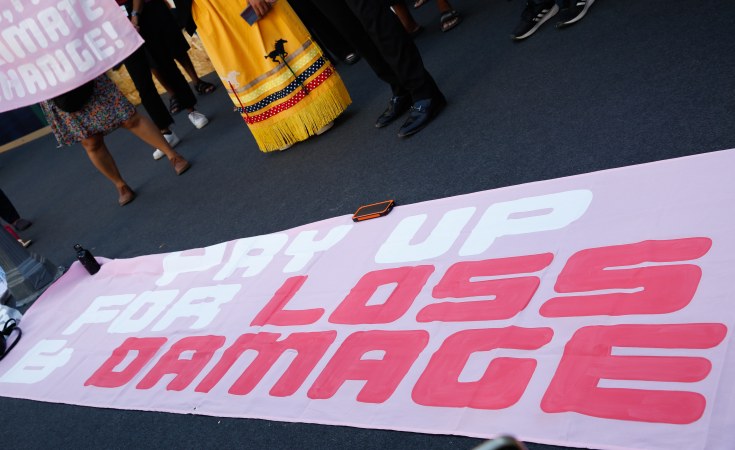Sharm el-Sheikh — A promise of U.S.$100 billion a year in climate funding is yet to be fulfilled despite being past its 2020 deadline
African countries are calling for more aid and policy support for dealing with the adverse effects of the climate emergency despite contributing least to historic emissions. We are very excited that loss and damage is on the table at COP27, says Collins Nzovu, Zambia's Minister of Green Economy and Environment. "But for us, that's not a win yet. A win for Africa will be that the funds start flowing ... we are asking that the developed world fulfill to its pledge".
Nzovu spoke at a high-level ministerial meeting hosted by the African Union Commission to update African Union member states, development partners, and financial institutions on progress in implementing the Green Recovery Action Plan (GRAP) 2021-2027. It is also in preparation for a pledging conference planned for the first quarter of 2023. The plan "will tackle the combined challenges of the COVID-19 recovery and climate change, by focusing on critical areas of joint priority, including climate finance, renewable energy, resilient agriculture, resilient cities, land use and biodiversity", according to the AU.
COP27 is billed as an 'African COP' and expectations are that African countries' exposure to some of the most severe impacts of the climate crisis will be prominent in the discussions. Africa faces extreme climate disruption, posing systemic risks to its infrastructure, water and food systems, public health and livelihoods, and threatens to undo development gains and increase levels of extreme poverty.
"I think all the topics, whether it's mitigation, adaptation, or loss and damage, the critical thing is to ensure that the funds are flowing. I think this is what we are telling the developed world. And even if it's on the agenda, we want to see that the implementation starts and starts as quickly as possible," he said.
Nzovu also spoke about the negotiations.
"The fact that we are beginning to talk about these things is that they are on the agenda. For us, that's a big score because it is a bit of a difficult topic of loss and damage. The fact that is on the table means that we have a chance to push the agenda even more. Remember Africa is coming together, more and more with one voice ... the developed world is listening. The developed world has committed, well, they've committed before but we can see that they're moving in the right direction. So we are very, very hopeful that something very good will come out."
Nzovu said that African governments are pushing for grants or concessional loans. "Remember this continent, which is most affected, is also a continent that is distressed economically. So if it's distressed economically, it means that you cannot add more debt. So we are trying to push for concessional funding for cheaper funding because we believe that we need to hold them accountable because they emitted more."
A key objective of AU's Green Recovery Action plan is to empower countries and regional economic communities on the African continent to build a better future and was jointly developed by the African Union Commission, the United Nations Economic Commission for Africa (UNECA), the Office of the Chair of the African Ministerial Conference on the Environment (AMCEN), and the United Kingdom in collaboration with the NDC Partnership.
African Union Commissioner for Agriculture, Rural Development, Blue Economy, and Sustainable Environment, H.E. Ambassador Josefa Sacko addressed the delegations. "Addressing issues in climate change and a green transition, especially in our developing context is quite challenging ..."It is not our choice to live through these horrible devastations and disasters of climate change in our generation let alone that of our children and grandchildren. The current climate change devastations are the results of early industrialisation that pushed the limits of tolerable global climate at the expense of poor countries. This is not and should not be a blame game on how best to respond. The desirable approach is collaboration to meet set targets, but with mutual and differentiated responsibilities. "
"The GRAP is not about rhetoric. It is about delivering concrete results for African countries and regions that contribute the least to greenhouse gas emissions but suffer the worst devastation from the effects of climate change for which Africa contributes less than 3% -4%," she added.
Nzovu stressed that African governments need to be accountable, saying that the money is just not thrown at you. It may come in partnerships, some of them public private partnerships and some to specific projects. "We believe that African governments are ready to utilise these monies much better than before. So the money will be saved and will go to ensure that the livelihoods of our people are improved."
This story was produced as part of the 2022 Climate Change Media Partnership, a journalism fellowship organised by Internews' Earth Journalism Network and the Stanley Center for Peace and Security.


